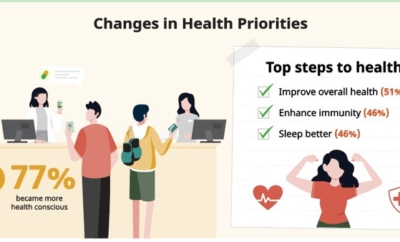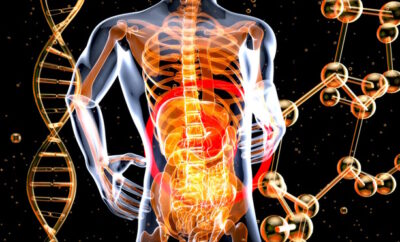
Health x Wellness
Beat the (COVID-19) Virus with healthy lifestyle habits
The WHO shared welcome news this week, that the new coronavirus – the COVID-19 virus – only causes mild disease in 80% of infected patients. In Singapore, 34 patients have already recovered and been discharged, out of a total of 84 confirmed cases.
However in China, the COVID-19 virus death toll has passed 2,100 with over 74,000 people infected in China. Many countries around the Asia region continue to impose a travel ban, or compulsory leave of absence from workplaces for inbound travellers from China. This has impacted tourism and travel-related business outcomes throughout the region.
WHO chief Tedros Adhanom Ghebreyesus warned, “Measures should be taken proportional to the situation. Blanket measures may not help.” This statement was made in the context of blanket measures such as travel bans being enacted upon by countries on travellers.
Michael Ryan, head of WHO’s health emergencies programme, shared that the infection rate at the epicentre of Wuhan, China was only 4 out of every 100,000 people. His opinion remains that the “…COVID-19 virus outbreak is serious and has the potential to grow but we need to balance that in terms of the number of people infected.”
Given the signal that countries should generally be prepared for the long-haul before there might be a breakthrough, many governments are encouraging good personal hygiene, and practices focused on preventing the spread of the virus within close groups such as a family unit or colleagues.
Dr Melvin Look from PanAsia Surgery and Cedele hosted a “Beat the Virus” lunch talk and shared about observing good personal hygiene and taking preventative measures to supercharge our immunity and strengthen our health.
Some of the key highlights of the talk includes:
What does our immune system do?
Our immune system identifies and attacks a variety of threats to our body such as those posed by virus, bacteria and parasites.
Interestingly, the GI tract (and by association the gut) works together with the Lymphatic System and has a strong impact on our overall immunity. The gut contains over 70 percent of the cells of the immune system leading to a co-relationship between gut bacteria and immunity. The immune system requires a healthy gut to provide nourishment.
Why are some people not affected by viruses as much as others?
Some people might not be as susceptible to viruses as the person might have a stronger immune system that results in either no infection or a milder condition
Why do some people have a weaker immune system than others?
Age is an important factor that affects people as there is a decrease in T Cells resulting from Thymus atrophy coupled with the bone marrow producing less stem cells.
Older persons also experience Micronutrient malnutrition. This occurs when the gut is less able to absorb nutrients from the food that we eat resulting in lesser nutrients being used by the body.
There might also be associated co-morbidities such as obesity and diabetes.
Is there a link between our diet and our immunity; and what can we do to improve our diets?
- Reduce intake of sugar in order to remove the food source for virus and bacteria
- Increase plant-based whole foods to increase micronutrients to the body
- Practice intermittent fasting to increase autophagy to help the body get rid of defective cells
- Take more micronutrients and antioxidants such
as Iron, Copper, Folic Acid, Zinc, Selenium and vitamins, B6, C, D, and E
- Vit B6 supports important biochemical reactions and can be found in chicken, cold water fish (salmon, tuna), chickpeas
- Vit C is an important immunity booster and cannot be produced or stored in the body and can be found in citrus fruits, peppers, spinach, kale and broccoli
- Vit D is a natural hormone vitamin and produced by the body when directly exposed to sunlight. It is an important pro-survival molecule in the immune system and helps reduce the likelihood of developing influenza. Food sources include salmon, sardines, egg yolk and shrimp.
- Vit E is an antioxidant that helps to fight infection and can be found in nuts, seeds, spinach
What are the major criteria for a healthy Gastro-intestinal (GI) System i.e. gut health?
Gut Health is one of the important goals of good health. The five major criteria for a healthy GI system include:
- Effective digestion and absorption of food
- Absence of GI illness
- Normal and stable intestinal microbiota
- Effective immune status
- Sense of well-being (the action of enjoying a good quality of eating and digestion process, but also the removal of waste from the body)
What are some conditions linked to gut health?
The gut is linked to conditions both within and external to the gut such as autoimmune conditions, arthritis, allergic diseases, obesity, fatty liver disease, fibromyalgia and chronic pain, Alzheimer’s, and Parkinson’s, depression and ageing.
What dare some factors that disrupt or impact good gut health?
- Diets high in processed foods such as refined carbs, sugar, processed meats and fats
- Seed oils
- Grain
- Chronic stress
- Chronic infections
These disruptions can lead to a leaky gut condition, that is, a situation where there is loss of intestinal barrier function and increased permeability, more negative bacteria in the gut that causes an immune system reaction due to endotoxins and a permeable gut that allows these endotoxins to escape into the blood stream.
What can we include in our diet to improve gut health?
- Add Glutamine
- Pick your fibre – resistant starch, prebtotic fibres
- Eliminate pro-inflammatory stimuli such as sugar, caffeine, seed oils (omega 6) , and processed foods
- Increase intake of anti-inflammatory foods such as omega 3 (fatty fish), fermented foods (prebiotics) and antioxidant foods
- Hydrate well
How can we achieve good gut health?
- Maintain a good diet
- Avoid excessive alcohol and tobacco
- Improve lifestyle with regular exercise and meditation
- Supplement with probiotics and prebiotics
- Different conditions are for different probiotics
- Diversity is more important than bacteria count
- Pick a stable delivery system i.e. how the bacteria travels to you pre-purchase and post-consumption)
- Prevent cancer by doing periodic screening endoscopy
What else can we do to improve our immune system?
A healthy lifestyle can help improve our immune system through actions such as not smoking, reduce stress and mental health, get sufficient sleep, reduce exposure to cold and to start exercising regularly. These tips will generally help promote good health, improve circulation and improves immune cell function.









